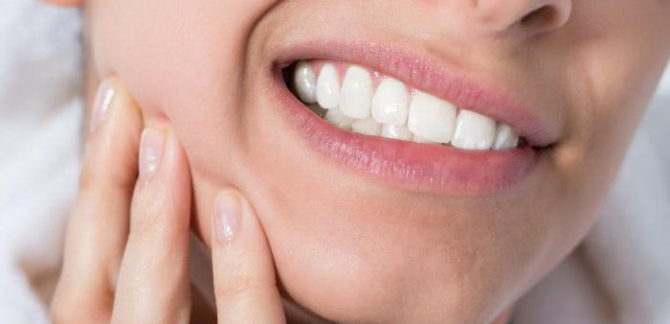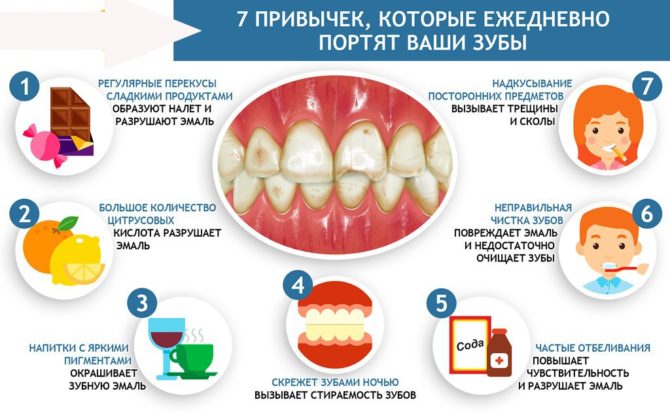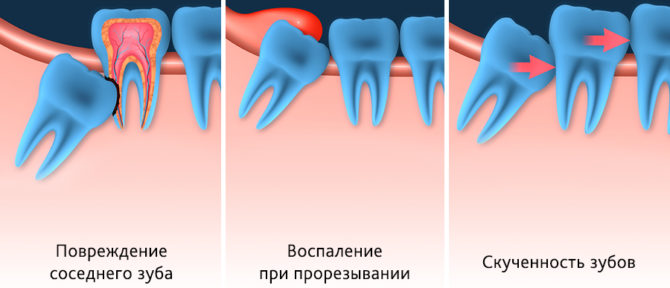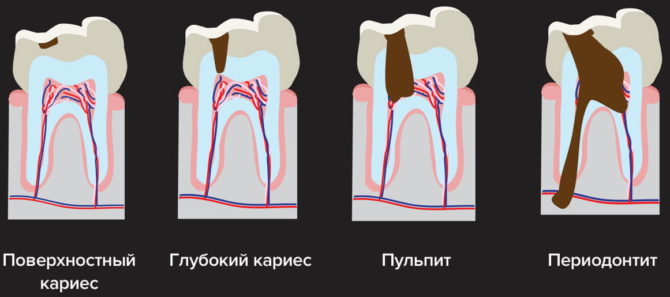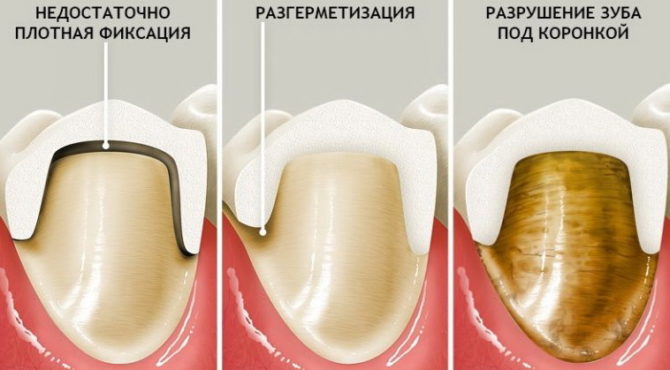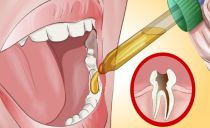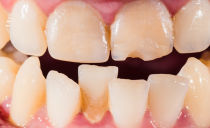Aching toothache: causes and what to do
Teeth can whine for a variety of reasons - from common caries to trigeminal inflammation. Therefore, before proceeding with their treatment and analgesia, you need to find out what served as the prerequisite for the occurrence of such symptoms. In many cases the appearance of aching pain indicates something more serious than standard dental diseases. If you make a mistake in making a diagnosis, the situation may worsen.
Content
Causes of aching pain with increased tooth sensitivity
More often than others, people with hypersensitivity to enamel suffer from aching pain. With such a dental defect, even innocuous external influences lead to painful sensations.:
- improper oral care;
- sour food;
- dental procedures.
With improper care of the oral cavity, aches in the teeth occur most often. If you regularly remove plaque with a hard abrasive paste, the enamel will be damaged. Microcracks form on it, through which food and other irritants penetrate the pulp and provoke aching pain.
Another reason for aching teeth is eating acidic foods. Usually sensitive enamel reacts even to cold and hot, but only increased acidity provokes severe pain.
Least of all unpleasant sensations arise after professional cleaning or whitening of enamel. And this is explained not by the fact that the enamel suffers less from dental procedures, but by the fact that a good dentist will not conduct classical cleaning or whitening of a patient with an increased sensitivity of enamel.
Causes of aching toothache on one side of the jaw
Aching pain in the teeth on one side of the jaw can occur for the following reasons:
- teething wisdom tooth;
- medium and deep caries;
- injuries
- inflammatory processes: pulpitis, periodontitis.
The growth of a wisdom tooth is almost always accompanied by pain. The third molar is a rudiment - an organ that has lost its significance. Modern man doesn’t eat like his ancestors do, so he doesn’t need additional chewing molars, which affected the structure of his jaw: by the time the third molar begins to grow, there is no free space left on it. As a result, the erupting figure eight presses on the gums, adjacent molars and jaw. In all cases, the tooth itself and the tissues around it hurt.
The cause of aching in the jaw can be commonplace caries. The disease destroys the enamel and dentin of the diseased tooth, gradually reaching the pulp - the inside of which the nerves and blood vessels are located. Gradually, caries develops into pulpitis - inflammation of the nerve bundle. Because of it, periodontitis can develop - inflammation of the layer between the tooth root and the jaw bone. In both cases, the pain will become more noticeable, will begin to intensify when you touch the tooth. Gums become inflamed and redden.
Common injuries are also accompanied by aching pain. In this case, understand why teeth are aching, You can do it yourself - without going to the doctor. Indeed, for this reason, an unpleasant sensation occurs immediately after damage and does not stop for a long time.
Causes of aching pain on both sides of the jaw
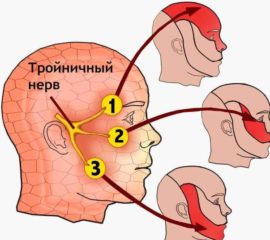 Pain in only one part of the jaw is not very dangerous. If all the teeth are aching from above or below, then it is worth worrying. The reasons why such pain has occurred can be very dangerous:
Pain in only one part of the jaw is not very dangerous. If all the teeth are aching from above or below, then it is worth worrying. The reasons why such pain has occurred can be very dangerous:
- trigeminal inflammation;
- sinusitis and sinusitis;
- problems with heart.
Inflammation of the trigeminal nerve or paranasal sinuses occurs due to colds and infectious diseases. Usually pathologies are accompanied by a general deterioration in immunity.
With inflammation of the ternary nerve, aching pain in the teeth and jaw is felt more strongly in the upper part of the face and noticeably intensifies with any movement of the mouth. Sinusitis and sinusitis are types of inflammation in the sinuses. They are covered with a sensitive mucous membrane, in which the inflammatory process occurs. Therefore, pain with sinusitis and sinusitis is also concentrated in the upper jaw.
The cause of aching pain in the teeth can be heart problems. If she gives to the shoulders and arms, probably a while ago the patient suffered a myocardial infarction.
What causes aching toothache after dental treatment
The question of what to do with aching toothache is of particular concern to those who have recently undergone dental treatment. Typically, such sensations occur after the following procedures:
- removal of a tooth;
- filling;
- crown installation.
After removal of the incisor, canine or molar, discomfort may persist for 3-4 days and is normal. To get rid of it, it is enough to drink painkillers prescribed by a specialist. An alarm should be struck only in those cases if the unpleasant sensations do not disappear after the specified period or are accompanied by temperature.
If the tooth hurts after filling, you need to be alert immediately. Typically, this symptom indicates a relapse of the disease or improper treatment. In both cases, you must immediately contact a specialist.
In the same way you need to do if discomfort appeared after prosthetics. Moreover, in this case, it does not matter how long the patient has a crown. If it is the exact molar or incisor that the prosthesis was fixed on, then a medical error is possible. You need to fix it as soon as possible, otherwise you will have to restore the teeth again.
What to do if tooth aches
To find out why it hurts your teeth, you need to identify additional symptoms. In the presence of temperature, redness and swelling, you should immediately consult a doctor. Such symptoms indicate that an infection develops in the body, which can lead to serious consequences.
First, go to dentistry. If the dentist does not detect dental problems, you will have to consult a therapist. After examination and questioning, the therapist can refer the patient to a narrow specialist: a neurologist or cardiologist.
As soon as the doctor determines the reason for the aching pain in the teeth, he will prescribe a treatment aimed at eliminating it:
- With caries, pulpitis, periodontitis, therapy is usually limited to the removal of damaged tissues and filling.
- If pain occurs after prosthetics, the dentist will install a new prosthesis for the patient.
- If the tooth hurts due to problems with the heart or nervous system, medication is prescribed.
Sometimes additional medical procedures or even surgery may be required.
What can be done at home
Sometimes you have to wait for a specialist for several days or even weeks. It’s simply impossible to tolerate painful sensations for so long, so you have to look for ways to get rid of them.
Find out why the patient's teeth are aching, and the doctor should determine the course of treatment. therefore home therapy comes down to taking painkillers and using anti-inflammatory drugs. The most effective analgesic drugs are:
- Paracetamol.
- No-shpa.
- Analgin.
- Ibuprofen.
With noticeable inflammation and swelling, it will be useful to rinse the oral cavity with antiseptic drugs. You can buy a ready-made solution in a pharmacy, for example, Miramistin, or make a homemade mixture of water and hydrogen peroxide.
With severe inflammation, it is better not to use such alternative methods of treatment as rinsing the mouth with decoctions of herbs or applying garlic to the diseased gum. Having resorted to them, you can aggravate the disease by bringing the infection into the affected tissue.

